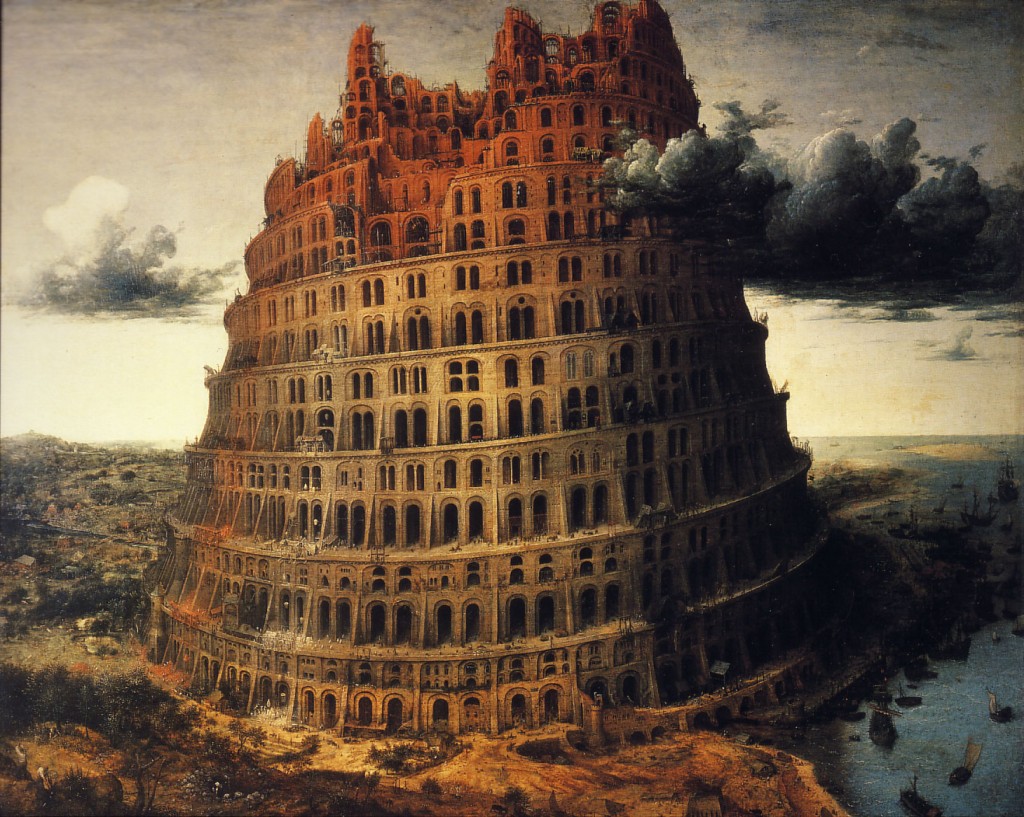The Babel of History May 2, 2012
Author: Beach Combing | in : Ancient, Contemporary, Medieval, Modern , trackback
The past according to a much worn-line is ‘a foreign country, they do things differently there’. Of course, if this were all then history would be a doddle. It would be enough to fill the Cutty Sark with sabres and give the natives music sheets for their acres. But, unfortunately for those who like the easy life, the past is many different countries and, almost as bad, the present is also a vast thalassocracy stretching to the horizon. The success of any historical venture will depend on the proximity of the historian’s land to the one he or she wishes to travel to: and that proximity depends to a large extent on language.
For a start, one language is rarely enough to study the past. There are the tongues that were spoken by the people(s) you want to study multiplied by the languages spoken by the nations that study them today. To deal with the Anglo-Saxons, for example, you would need Anglo-Saxon and Latin and perhaps some rudimentary knowledge of the Celtic languages or Norse. But you would also need English, German, French and (preferably) Spanish and Italian for secondary sources. That is bad enough, but let’s say you had an attitude problem and decided to study Anglo-Saxon missions in Scandinavia: then you would have to add Swedish, Danish and Norwegian. Or perhaps you decide to do your doctorate on Anglo-Saxons in the Varangian Guard in eleventh-century Constantinople: Greek, ancient and modern would matter and quite possibly Turkish and a couple of Slavic languages. If you are really serious about the Varangians you could do a lot worse than marry a Bulgarian.
Some areas of the past are neglected not then because they are inherently difficult in source terms, but because there are impossible language combinations. In some senses, this is becoming less common (for secondary sources) as English becomes the language of choice in academic journals. But, in other ways, it is getting worse as ‘minority’ or despised languages start to assert themselves. Take another example: the ancient Mediterranean was ultimately split into a Latin speaking western half and a Greek speaking eastern half. In the good old days scholars needed Greek, Latin and the colonial languages, French and English to study the Roman province of Africa. Today the Mediterranean is split between the Romance and Slavic speaking north: with Albania and Greece tagged on and the Arabic speaking ‘southern shore’. In the twenty-first century it will be a handicap for a Roman historian determined to study that same province not to know at least some Arabic for archaeological reports. Greek and Latin and a smattering of modern European languages will no longer be enough.
Of course, these kinds of examples are not just restricted to the classical world. There is no definitive book on the Voyage of the Damned, the final phase of the war between Japan and Russia in 1904/1905 for the simple reason that no scholar of stature has both Japanese and Russian. Ditto pogroms in the Second World War: who has Hungarian, Romanian, German, Polish and the Baltic languages? The Nazis and their friends killed many of those who could have replied ‘yes’ to that question. More modestly, the present author’s most productive medieval research took place a decade ago with material involving three different Indo-European language families. There was, in scholarly terms, lots of low-hanging unpicked fruit simply because no one who had troubled to look at it, had had this combination of languages before.
Then if this all sounds easy what about this email sent in by Mike Dash on the languages needed to master the story of the Mongols?
Someone – it might have been JJ Saunders – commented that to do a thorough history of the Mongols would require a historian who spoke, at minimum, Chinese, Japanese, Persian, Turkish, Arabic, Armenian, Syriac, Latin and Russian (just for the original source materials), plus of course ideally Mongol itself (for the Secret History.) Then to read what historians have written, which has not been translated, you’d need at least German and French as well as English, and ideally Czech and Hungarian. Hence in a discipline in which it is rare for a seminal work to stand unchallenged for more than 20-40 years (the longer period, I think, for the medieval stuff) there is always W. Barthold’s Turkestan Down to the Mongol Invasion, originally a PhD thesis defended at St Petersburg in 1900. It remains the standard work because no one since has mastered all the languages required to supplant it. It would be interesting to know if any still-standard work on any other place or time antedates it.
Beach wonders if anyone could come up with a more challenging selection than Mike’s. It makes messing about with Old English and Greek look positively tame: drbeachcombing AT yahoo DOT com
***



